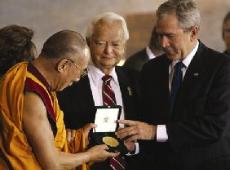Shaking hands with President George W. Bush on Oct. 17, the Dalai Lama received Congressional Gold Medal struck with a design unique to his lifelong achievements.
“I am deeply touched that this great honor has been given to me, a Buddhist monk born of a simple family,” the Dalai Lama said.
In a politically sensitive transition, as it holds the Communist Party Congress as a part of its five-year internal election cycle, China has protested the award as U.S. support for the Dalai Lama.
“The move of the United States is a blatant interference in China’s internal affairs,” said PRC Foreign Ministry spokesman Liu Jianchao to BBC news.
The spiritual leader of Tibetan Buddhism and the leader of the Tibetan Government in exile, Dalai Lama Tenzin Gyatso currently lives in India along with an estimated 100,000 Tibetans exiled from their homeland. The Dalai Lama had ruled Tibet since the 17th century until the 1959 communist takeover, but Dalai Lama Gyatso has recently shifted policy to negotiate for the same kind of independent autonomy from the PRC that Hong Kong currently enjoys rather than independence.
“Beijing continues to allege that my hidden agenda is a separation and restoration (of) Tibet’s old social political system,” said the Dalai Lama in his acceptance speech to CNN New. “Such a notion is unfounded and untrue. Much of the world is waiting to see how China’s concepts of harmonious society and peaceful rights would unfold.”
According to Associate Professor of Political Science George Guo, possible U.S. influence has hampered negotiations for the PRC, which is currently trying to balance “One China” and “Open China” ideologies with regional disputes and explosive economic growth.
“With an ideological gap following the fall of communism, China is still vulnerable to the influence of a powerful belief,” Guo said. “They aren’t sure the Dalai Lama won’t change things, and they’re concerned about foreign influence.”
President Bush’s words at the ceremony did little to ease Chinese ire, as he continually stressed the importance of independence and religious rights.
“Americans cannot look to the plight of the religiously oppressed and close our eyes or turn away,” Bush said.
The Foreign Ministry has threatened that the issue could impact Chinese trade policy, and have summoned American ambassador Clark T. Randt to negotiate. Canada faced similar outrage from the PRC when it made the Dalai Lama an honorary citizen.
First given to George Washington in 1776 by the Continental Congress, the Congressional Gold Medal is the highest civilian award in the United States. Each medal is intended for display rather than wear, and is struck by the U.S. mint with a unique design specific to the recipient’s merits. The Dalai Lama joins the ranks of Nathaniel Green, Mother Teresa, and Charles Shultz.

